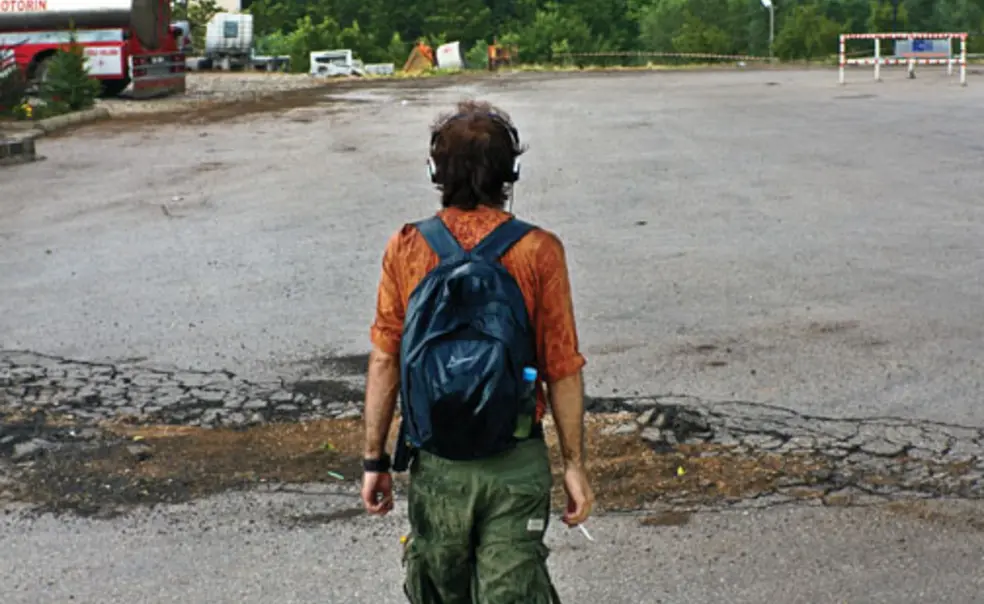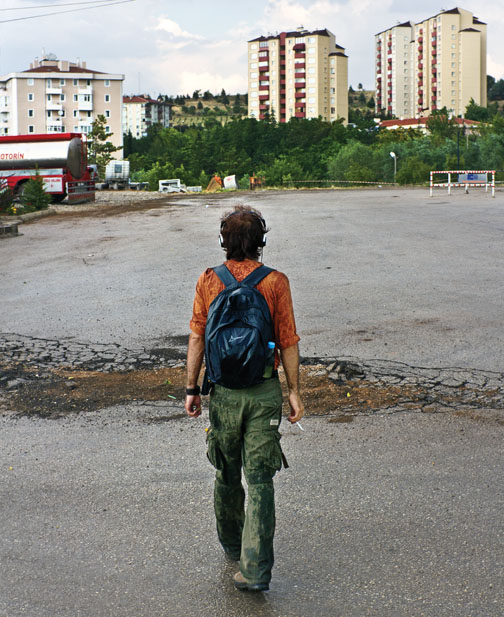I was in Turkey last summer working for an NGO called the Committee to Protect Journalists. The group had me interviewing a few of the dozens of exiled Iranian reporters stuck in Turkey as they waited for months or even years for the United Nations bureaucracy to process their applications for refugee status. The one I got to know best was Kambiz Shabankare, a wiry multimedia journalist and liberal activist who’d been in and out of prison over the previous decade because of his participation in political activities and his critical writing about Iran’s rulers.
He spoke a funny, often-obscene English he’d picked up watching South Park and listening to American expats in the nightclubs of Dushanbe, Tajikistan. Kambiz had escaped to Afghanistan and then to Tajikistan, where he stayed for four months training local television-station employees and partying until he heard from a friend with embassy connections that Iranian intelligence agents had found out there was a wanted journalist in town. So on he fled to India and then Turkey, to join thousands of other Iranians applying for asylum in Europe or North America.
Asylum-seekers in Turkey aren’t legally allowed to work, and Kambiz didn’t do well with boredom. He needed to work, to travel, to have a purpose — or his mind would return to his time in prison and to the survivor’s guilt that paralyzed him. Sometimes he told me that he wished he still was in prison so he could at least go on a hunger strike, or that he wished it had been him, and not that teenage boy next to him, who’d been shot in Tehran’s Azadi Square during a political protest in June 2009.
We decided to take a trip together to Konya, a city in central Turkey that is best known as the resting place of the 13th-century poet Mowlana Rumi. We’d bring our cameras and invent documentary assignments for ourselves. My subject was, of course, Kambiz, though I’d have to be his friend and kind of sneaky for it to turn out well.
The symmetry of it! Like Kambiz, Mowlana was a Persian who’d spent time in Afghanistan before ending up in Anatolia. It sweetened the deal that Kambiz had dozens of Mowlana’s verses memorized. I would capture the emotional encounter of émigré Persians alive and dead, and it would add some narrative spice to the interviews I’d been recording.
When Kambiz and I departed for Konya on a Thursday afternoon, I was tired and grumpy but he seemed to be in fine form. On the bus ride to the airport he quickly befriended and then entered into an intense theological debate with a young woman in a flowered headscarf and demure raincoat. Hatice, as she later introduced herself, spoke the precise but hesitant English of a B˘ogaziçi University student who hasn’t used the language much outside the classroom, in what I found an amusing contrast to Kambiz’s rapid-fire ungrammatical slang.
For all her soft-spokenness, Hatice turned out to be a fiery dependista , and on the few occasions when Kambiz took a breath between condemnations of religion as an engine of repression, she jumped in with counterarguments about Western economic imperialism and institutionalized global inequality. This went on for some time, first on the bus and then around the terminal after we’d picked up our plane tickets, and then in an airport café, where Kambiz ordered a beer and Hatice a Coca-Cola.
Kambiz survived mostly on cigarettes, coffee, and Fanta during our four days in Konya. We shared a hotel room for about $40 a night and ran out of Mowlana-related sites to visit fairly quickly. We didn’t even notice the poet’s shrine the first time we passed it, nor was there the sudden outpouring of emotion for his homeland by Kambiz at the site of his compatriot’s tomb that I’d hoped for.
Once we’d seen all the museums and mosques, we just wandered around town from café to café, and when he wasn’t busy destroying me at backgammon, Kambiz talked a lot — mostly about women, but interwoven were tangential ruminations about the superiority of Persian to Arab or Turkish civilizations, or the silly differences Kambiz had observed between Americans and Europeans. He hadn’t been to the United States or Europe, but he had watched a lot of TV and dated a Polish girl, so he was an expert on both. I would try to steer the conversation subtly toward his hardships and prison beatings, without much success.
Our last evening in town, as we waited out the heat in our hotel room before a whirling dervishes show, Kambiz sat on his bed in skimpy gray underwear and discoursed on Rasputin’s role in Russian imperial statecraft and Swedish dating etiquette and aspects of the human anatomy that he’d learned about from South Park. He went on discoursing as I gave up even feigning interest and took out my laptop to write a cathartic blog post. “I’m going to strangle Kambiz” was my opening.
Then, without my asking, Kambiz started talking about his childhood. He came from money. His family ran a lucrative import-export business from Bandar-e Azali on Iran’s north coast and had high government connections. Kambiz, the eldest son, was to be the pride and joy of the family and heir to the business. They started him on private piano lessons when he was 3 years old, which didn’t take. Kambiz made a point of wearing cheap clothes to school, but still ended up with an entourage of fake friends who liked him because he had more toys than they did.
After high school Kambiz began to work in the family import-export business, as expected. He was earning the equivalent of $5,000 a month, a lot by local standards. But soon it was clear that he had neither the interest nor the moral disposition for Iranian-style commerce. And then he told his parents that he wanted to go to art school instead of studying mechanical engineering.
He went to college, then got kicked out for political activism. Kambiz became a journalist, which sometimes paid the bills and sometimes didn’t. He was homeless for several months, not telling his family or asking for money. He slept in a park while he went on working for a magazine. A co-worker found him there one night; Kambiz said that he was doing research for a project on the hard streets of Tehran.
It occurred to me that I’d been too busy looking for a good story, and was doing a miserable job of it as a result. Kambiz was an interesting guy, and I didn’t have to squeeze him into my plotline.
I live in Brooklyn now. We keep in touch. He opens his e-mails with “Hi dude” and closes them with “Sincerely yours, Kambiz Shabankare.” He wrote that he was keeping happy and busy, taking English and French courses online and writing for free for citizen-journalism websites. He was hoping to be resettled in California. I joked that he should fly into New York so we could take a road trip to the West Coast, stopping in Vegas on the way. The mention of Sin City elicited a whoop from Kambiz that far exceeded Skype’s audio capacities.
I’ll see if my parents will let me borrow their car. And this time around, I’ll try to be less of an opportunist and more of a friend.
Noah Arjomand ’10 focused on Middle East policy at Princeton. He will be entering a Ph.D. program in sociology at Columbia in the fall.














No responses yet